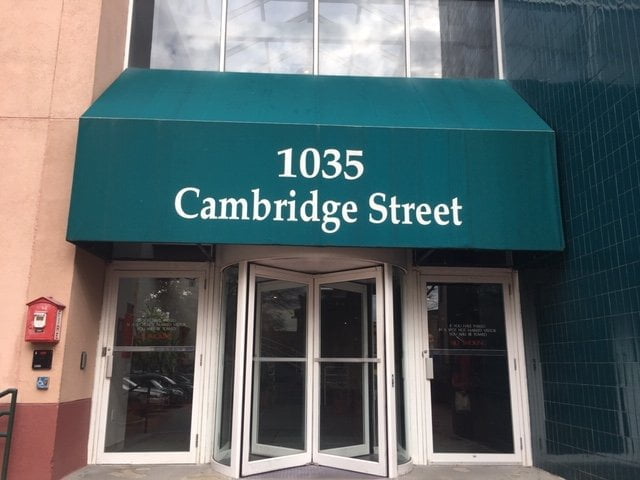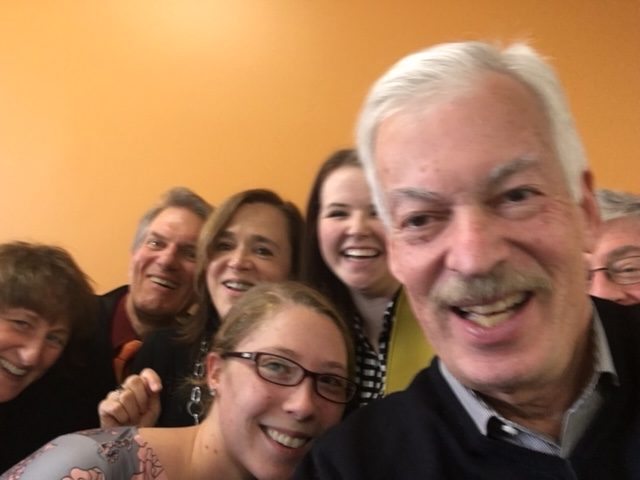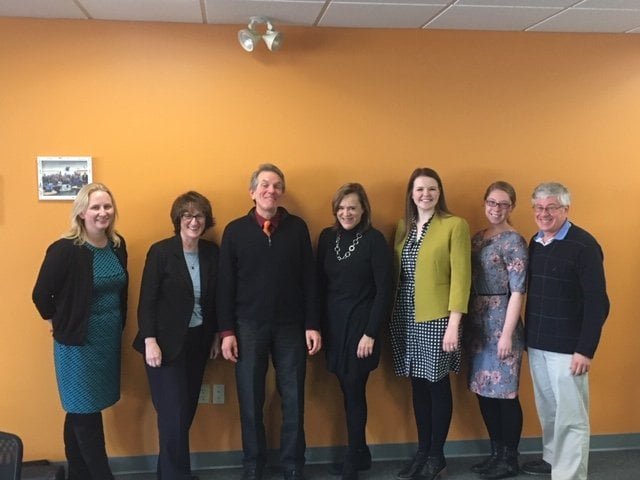Better Than Most is a regular feature of The Business of Giving, examining the best places to work among social good businesses and nonprofit organizations.
Denver: And for this edition of Better Than Most, youll be going to Cambridge and to the headquarters of iCivics. We will start with their Executive Director, Louise Dubé and then hear from some of the members of the team.

Louise: We were founded by a Supreme Court Justice who had a vision, but she had a vision beyond herself, so as part of the original idea for iCivics, it was about fun and engagement. It was about reaching kids and teachers, so what’s always interesting to me as in any organization, the culture survives any one individual. I would leave, anybody would leave, it would still be the same, and it is rooted in its history, as is civics.
Christina: Everyone cares so much about one another. Everyone cares so much about our mission, and you really can’t walk into our office or go through a work day without realizing that. I think it’s really obvious in everything that we do, and it really spills over into how we treat one another and how we choose to go about the day collaborating and working hard to make sure that we’re doing as much as we possibly can to fill our mission.
Dave: But I think the two of them have a very understated way of managing things here and keep a pretty calm tone to the work when there’s actually a lot going on and there could be cause for some concern at certain times and what not but we keep plowing ahead and we maintain that sense of calm. I really appreciate working with both of them particularly and the whole team here.
Sue: The thing that I would say that really not hard not to feel the first day that you walk in about our culture is that the organization is incredibly teacher and student-focused. Very passionate about building good, excellent, high-quality resources for teachers and students along with that incredible passion about civic education. When I think about what’s a favorite day at iCivics, it’s definitely when you get to interact with teachers.
Molly: We are the kings and queens of GIFs, which has not come up yet, so we don’t have Toto Tuesday but if someone does something or somebody thinks something is funny, next thing you know, there’ll be 12 or 15 GIFs flying back and forth with funny things that you can’t even believe people found, but it’s nice that people feel that they can take the time to do that, and that people appreciate it, and that sharing humor with people is important no matter how busy you are, that’s a really nice part of the culture, so I think that’s it for me.
Patricia: Something that has been a nice culture shock for me coming from where — I’m relatively new here — I was with an industry that was more male-dominated, that it’s really unique working somewhere that not only was founded by a trailblazer who’s female, but the leaders of this company are also female. I think people really feel empowered to speak up and join the conversation. You never know where a good idea or a good solution is going to come from, and everyone really values the diversity of perspectives that everyone brings to the table. No one’s going to discredit your opinion just because you are female, or a millennial, or whatever the case may be.
Louise: If you were to go through Sue’s records and our board documents, you will find that we are very buttoned up, so while we give the impression that we are fun and engaged, we are both sides. It’s very unusual a culture for us to be both of those things at the same time, so when I originally joined here, maybe four and a half years ago, I realized that this is a very complex organization for a 10-person shop. I’m like “Wow! Look at that, triplicate copies of everything” and I could just sense that those roots and now with Justice Sotomayor on the board, that continues. We are an extension — not directly — but an extension of the court, and that kind of discipline is on us.
Matt: One of the things that I believe, from the bottom of my heart, that this is true, is that we are one of the most high-efficiency and high-performing teams that I’ve ever worked with, and what that means is that when there’s a job to do and a deadline that seems difficult, everybody pulls together and pitches in.

Christina: To talk a little bit more about feedback, I just started a few months ago but I felt welcome from day one to give feedback, to pitch new ideas, to sit down and talk with Sue or Matt about ideas that I had for our organization or our website. That’s something that I think is really special that day one, sure I have some background about the organization I served as an intern but day one, Taylor, who’s our senior curriculum developer was sending me documents and asking for my feedback and my thoughts on our curriculum resources, and I really think that that says a lot about our organization that I was trusted with that on my very first day.
Dave: I came from an organization where there’s a lot of hierarchy and a lot of tradition of that and some major limitations to the decision-making process and the amount of innovation that’s possible because of that. And coming here, we’re a smaller organization, so it’s simpler to have less hierarchy. But I think that’s been a real benefit here. I feel like everybody does have a say in making decisions here and playing a role in thinking through issues as they come up.
Sue: The thing I would say that we do talk about trying to get better at is celebrating successes which I think is probably pretty common for driven teams who are trying to achieve big goals. We will much more often take time to look at what we didn’t do right as opposed to celebrate the phenomenal successes that we’ve had. So we’re deliberately focusing on that and trying to take more time to celebrate when we see many successes.
Patricia: The things that came up, and we were having so much fun while also solving strategic issues that are related to our industry. I did not expect to over the course of that few days, bond with our team so much and just feel like I was really a part of the team, and I think it came from the I was new and just getting my footing. But then also just having that time annually to connect in person is so important I think and so I was really grateful that that’s something we do every year.
Louise: I don’t feel like I own it like if I had founded it. I am as ED that was a hired gun, there is a certain amount of distance between you and the organization. But the advantage of this structure is that you feel a duty to a legacy that you might not feel otherwise. You take things a little bit less personally. Because the organization is not about me. It’s about iCivics and it’s like a sea, it allows you a certain level of, a layer of being able to think about it critically from the outside but ensuring that it will be here forever. That’s our legacy to Justice O’Connor is that it will be here forever.
Matt: I think we use technology in a way that glues us all together whether it be our conference calls or just putting together shared documents or sharing new builds with the rest of the team and gathering feedback and then people asking questions about why did they do this? Why did they do that? .
Christina: I think back to day one, I’m 23, I have a lot of friends who are starting out their first real jobs right now, and I asked them, how is your first day. They’re like, “Oh, it was pretty good. I did some HR stuff, and I read through a binder.” My first day, I played video games. I really got familiar with our organization, and I learned about what we do but more importantly, I learned about why we do it that way. I think the intentionality from day one to really focus on the history of our organization, what we tried, what works, what doesn’t work; that is really engaging, and it brings it to the next level.
Dave: I think the challenge for us is being thoughtful and strategic about where to put our money, where to put our time, where to put our staff time. That’s one of things I’ve noticed in our discussions has been a continuing point of discussion, continuing point of challenge, and I think that it’s been very helpful in terms of the kind of leadership that Sue and Louise offer that we are frequently reigning ourselves in about, or reminding ourselves that we need to maintain a certain focus and realize our limitations but also maintain that big vision that I mentioned earlier. It’s about balancing those. I think it’s a challenge for us but it’s also a point which keeps us alive and thoughtful about our work.
Sue: For an organization for Justice O’Connor to have years ago thought the country really needs civics education and to have it much more of an uphill battle to convince people of that, I think one of the vibes is, yeah, they’re getting it. They understand. They know how important this is. There’s also, holy cow, we’re really a small team. How are we going to do this? We know that we can build on this team. If the resources are coming more people get behind this. We can absolutely build on this team, and we can make this happen. I think it is a vibe of very excited, also probably, holy cow, and just that passion coming through of this is what the country needs.

Molly: There is that excitement, there is that vibe but also we are absolutely nonpartisan in a ridiculously hyper-partisan time but there very grounding about working on something bigger and not being… you can go into a meeting and come out and there’s 12 new stories that are all, people are going nuts, comments boards are blowing up about it. No matter where you are in the political spectrum, nobody’s happy at the end of any given day. Or we’re working on something bigger, it’s like keep calm and carry on to it which is a nice balance to the excitement and momentum because we all feel that this is important. Even if today was a chaotic day and usually is in the world, there is something bigger going on, and we can see it. Being able to see that light at the end of tunnel hopefully shorter rather than longer is a really unique part of our culture.
Louise: I think if you look at every organization, I’ve led and been part of many either nonprofits and for profits, if you look at the initial story of how this got started, you can see a direct path to its success or its failure. So, that’s my profound belief that I can see why maybe sometimes 10 years later, why an organization didn’t work by just listening again to the story of how it got founded. This one really was about solving a problem. It was about solving a problem in the classroom that civics education just wasn’t present but mostly was totally irrelevant to the kids’ lives. This is why I feel like that history and that dedication and the justice are really part of what makes us a success.
Denver: I wanna thank all those who participated in this piece: Sue Meehan, Patricia Leslie-Brown, Matt Osber, Christina Wiley, Dave Buchanan, and Molly Morrison. To hear this again, read the transcript or see pictures of the participants or offices, simply go to denver-frederick.com and we’ll have there a link to my full interview with Louise Dubé, the Executive Director of iCivics.

